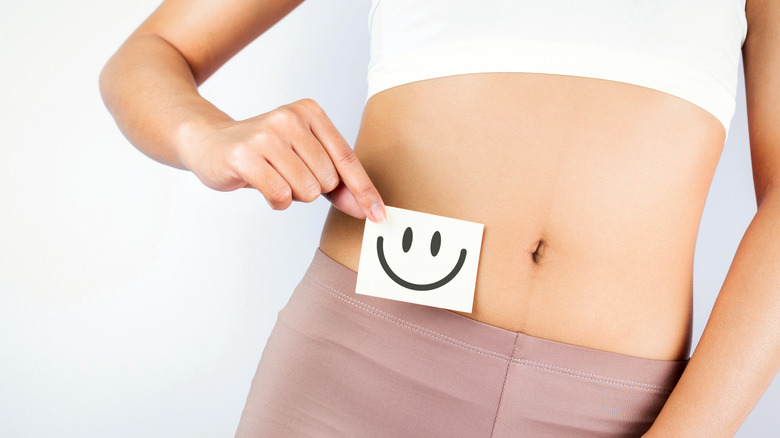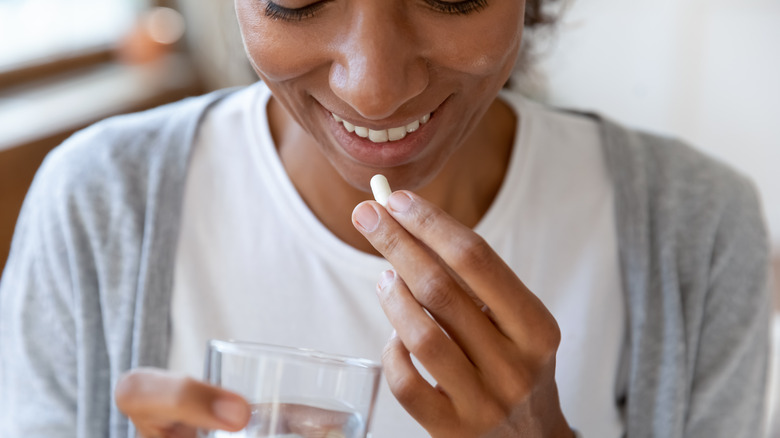Your brain controls your stomach and intestines. When you’re hungry, the brain activates your appetite and signals your digestive organs to prep your stomach for food, according to a 2009 study published in Endocrinology and Metabolism Clinics of North America. Similarly, what’s going on in your stomach can directly affect the state of your brain. This two-way communication system is called the gut-brain axis (via BMC Psychiatry).
The bacteria in your gastrointestinal (GI) tract have the ability to both hurt and heal your brain. Studies continue to show that poor gut health might be the root cause of many different mental health problems (via BMC Psychiatry). For instance, people with depression have a different population of gut microbes than those without depression. In particular, they have lower levels of the Coprococcus and Dialister species, according to a 2024 study published in Nature Microbiology.
There also appears to be a biological overlap in the gut bacteria of people with certain psychological conditions. A 2024 review published in JAMA Psychiatry looked at 59 studies examining the gut microbiomes of individuals living with various disorders including schizophrenia, obsessive-compulsive disorder, and anorexia nervosa. The researchers found that patients with depression, anxiety, and bipolar disorder had certain gut microbial strains in common — they had more pro-inflammatory bacteria and less anti-inflammatory ones than other participants.
How do your gut and brain communicate?

Your gut microbiome is the unique ecosystem of trillions of bacteria, fungi, and viruses (via Brain Research). These microorganisms play a big part in how we feel, how our gut functions, and our overall health.
Some researchers have theorized that the gut has its own little brain called the enteric nervous system (via Neuroendocrinology). This is a complex network of nerves, neurons, and neurotransmitters that are situated along the digestive tract. When the “bad” bacteria inhabiting your intestines outweigh the “good,” chemical signals are sent to your brain via the vagus nerve, letting you know that something is off (via Translational Psychiatry).
It’s also believed that certain bacteria in the gut are responsible for producing the amino acid tryptophan (via Nutrients). Tryptophan is converted into the neurotransmitter serotonin — also known as the body’s “happy” hormone — which manages our mood, brain function, and circadian rhythm. However, people with depression convert tryptophan into a toxic substance called kynurenine instead of serotonin, according to a 2024 study published in Progress in Neuro-Psychopharmacology & Biological Psychiatry. This depletes their serotonin levels and exacerbates depressive symptoms.
Can changing your diet improve your mental health?

Some may question the causal link between gut bacteria and mental health. For instance, do bad bacteria cause psychological issues like depression, or can depression lead to an imbalanced gut microbiome? Either way, there’s a lot of strong evidence that taking care of our gut health can have a positive effect on our mood and mental health (via Progress in Neuro-Psychopharmacology and Biological Psychiatry). Furthermore, there are plenty of lifestyle and dietary choices that can be beneficial.
Our diet is one of the key factors that affect our microbiome (via Psycom.net). A diet rich in foods with probiotic or prebiotic ingredients can help keep gut bacteria in check. Probiotic foods contain live beneficial bacteria. These include plain yogurt, kefir, fresh sauerkraut, kombucha, kimchi, and apple cider vinegar. Prebiotic foods, on the other hand, contain indigestible fibers that induce the growth or activity of beneficial bacteria in the gut. Some of these foods are cabbage, onions, garlic, artichokes, asparagus, and oats.
Probiotics can also be taken as supplements (via Psycom.net). It’s been shown that not only do they help restore gut microbiome balance, but they can actually relieve the symptoms of depression, anxiety, and other psychological and neurological conditions.



